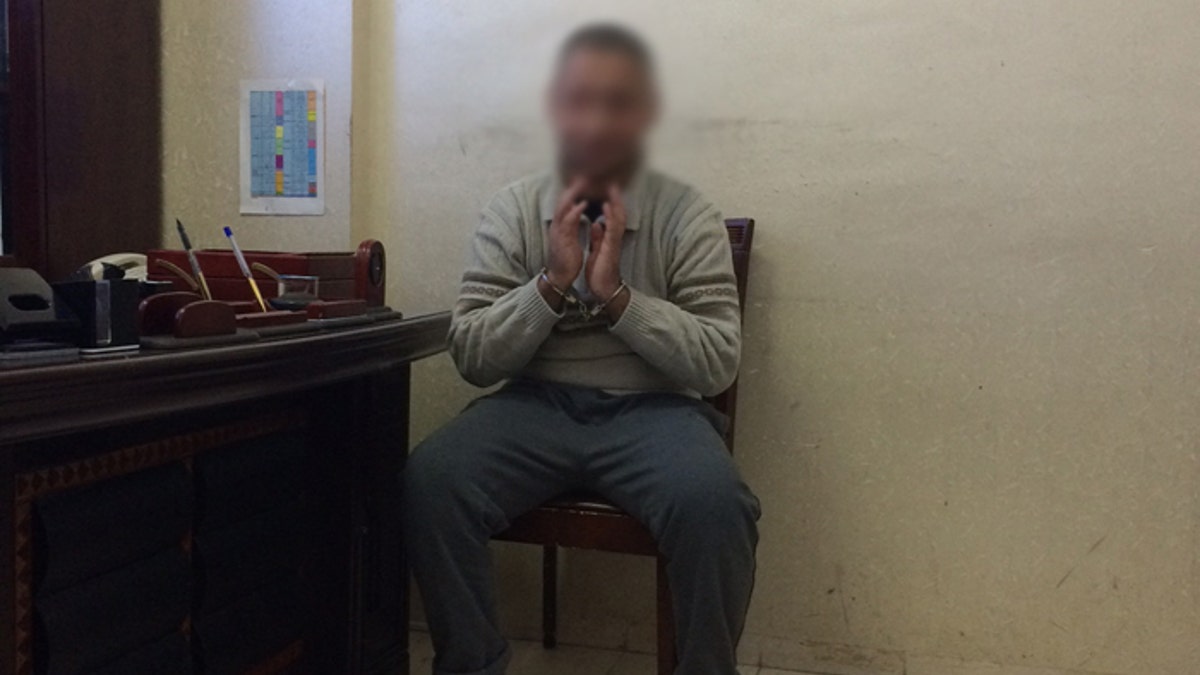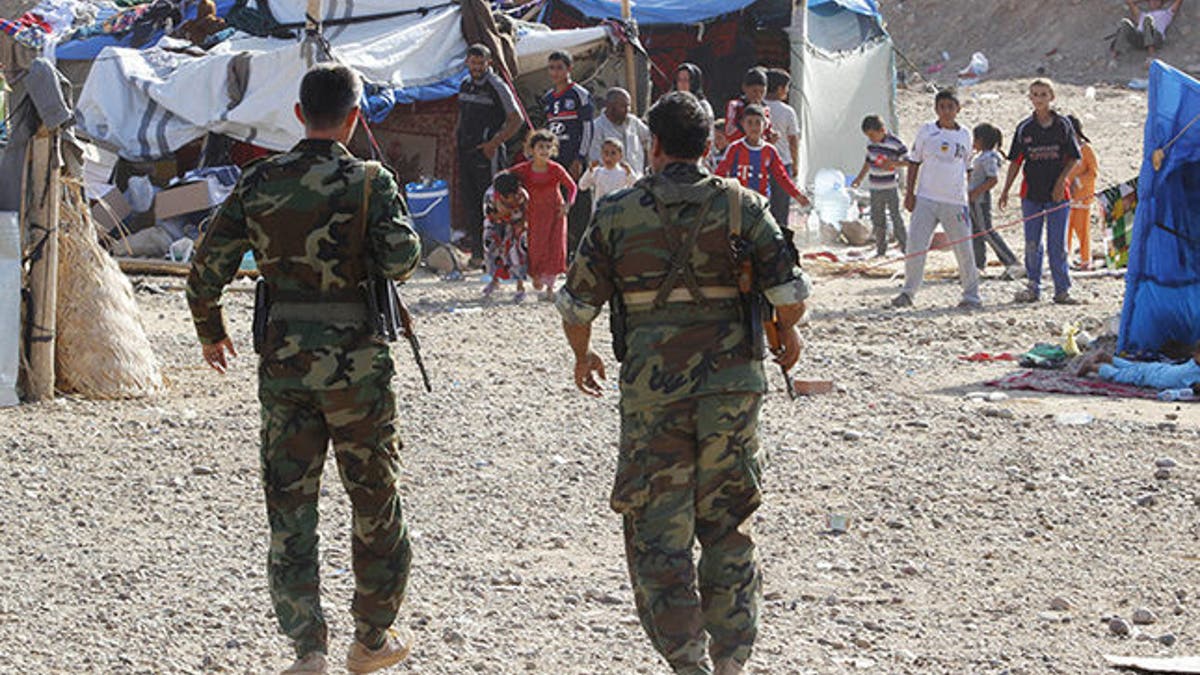
ISIS bombmaker Jasim Mohammed Atti'ya has no regrets about making suicide vests, but says he would never wear one. (FoxNews.com)
ERBIL, Iraq – The attack was brazen and struck deep inside Kurdish territory in northern Iraq, with an ISIS suicide bomber detonating at a checkpoint outside a small town near Kirkuk and allowing three fellow fighters to sneak through and temporarily commandeer a local government office.
The men evaded justice at the hands of the Kurds when they blew themselves up in the Nov. 3, 2015, attack, but the ISIS bomb expert whose handiwork sent them to their maker did not. Jasim Mohammed Atti'ya is now held in a high-security prison operated by the Kurdish Regional Government (KRG), which recently allowed FoxNews.com to interview him. Over the course of 90 minutes, Jasim, who was led into the room blindfolded, boasted of his service to ISIS, vowed to return to serving the caliphate and said his suicide bombs are for others, not him.
“What I did were terror acts,” Jasim, 22, said matter-of-factly as he sat handcuffed in a small office in the Erbil headquarters of the KRG’s security forces, the Asayish. “It was my duty. There are infidels and there is instruction in Koran to stop this and fight all infidels.”
“We want to go to America. We want to spread our ideology all over the world.”
KRG forces nabbed Jasim weeks after the attack in the small town 30 miles outside of Erbil, in which 14 Kurds were killed and scores wounded. The three fighters who used the checkpoint bombing as a diversion to enter the city, briefly holed up in the mayor’s office before blowing themselves up as Kurdish forces moved in.
While that attack, in the Kirkuk Province town of Dibis, served notice ISIS was able to strike behind enemy lines, the one thwarted by Jasim’s capture would have been devastating by comparison. His Kurdish captors say Jasim was preparing to rig a powerful truck bomb bound for the Kurdish stronghold of Erbil when he was arrested by Kurdish intelligence agents. According to one security source, Jasim “cried like a big baby” when he was arrested, sobbing that “Allah would be mad at him.”

Kurdish Peshmerga forces patrol near a family that fled ISIS in Jasim Mohammed Atti'ya's hometown of Hawijah, Iraq. (Reuters)
Now held along with scores of other ISIS prisoners, he is awaiting trial on charges of terrorism and plotting suicide bomb attacks and facing the gallows if convicted. Kurdish officials say the prisoners are held in conditions compliant with international law and receive visits from the Red Cross. Jasim, who was handcuffed and wore casual clothes and orange flip-flops during the interview, has contact with other prisoners and appeared to be in good health. Kurdish officials asked that his face be blurred in photos to protect his own innocent family members.
It’s been a steep and rapid fall for a youthful killer who joined ISIS at 20 and quickly rose through the ranks based on his loyalty and ingenuity. After first training to build explosives, Jasim said he was promoted to the mid-level leadership post of Amir. He imparted his newfound knowledge of IEDs to recruits and helped plot and execute suicide attacks, he said.
Several Peshmerga, police killed retaking Dubis mayor’s office from ISIS militants https://t.co/Hgcm6kMK9l pic.twitter.com/ndbiy8iNyO
— KRG-USA (@KRG_USA) November 4, 2015
“I had all this power and then I got arrested,” Jasim said. “When you have all that power you feel like no fears.”
An Asayish official confirmed that Jasim was “very clever” and seen as an up-and-comer in ISIS. He is suspected of leading a sleeper cell in his hometown of Hawija, a large city some 170 miles north of Baghdad, before being assigned to go undercover 30 miles north in the Kurdish-held city of Kirkuk, where he plotted the November attack.
The exact number of deaths Jasim directly or indirectly caused remains unclear, but he repeatedly gloated about conducting operations that killed and harmed scores of people – including the fighters he outfitted with suicide vests or put behind the wheels of vehicles rigged to explode. He told FoxNews.com he is proud of his monstrous work, but not ready to be a martyr himself.
“I never thought of killing myself, I am not convinced to kill myself,” he said. “Actually I would leave or escape if they gave me this order. I wouldn’t explode myself. That is another level of faith.”
Jasim said he joined ISIS as it was on the rise in Syria and northern Iraq after a friend who had joined introduced him to key members of the terrorist organization. He gave an oath to local leaders, and was soon learning his lethal trade, he said.
“I spent two weeks in-training, one week for IEDs and one week learning how to put explosives in vehicles,” he said. “I was introduced to a bunch of other people and after they tested me and I got successful planting the IEDs and explosives in the cars, they promoted me to Amir in Kirkuk.”
In Kirkuk, which Kurdish forces had retaken months earlier, Jasim worked undercover and at the direction of an ISIS higher-up who contacted him online. Given “three persons ready to suicide,” Jasim said he was ordered to send one to a city courthouse wearing an explosive belt he fashioned.
“It was nighttime, so I met the person who wanted to suicide from a secret hilly area outside the city and took him back to Kirkuk where he stayed with me for two days,” Jasmin said.
Without notice, his ISIS contact called off the operation, saying that Kurdish security had tightened and the risk of failure was too high. Instead, he had a new assignment, and one which would elevate his stock: The attack on Dibis. The high body count and success in bypassing a checkpoint to strike a blow in Kurdish territory pleased his handlers and led to an even more ambitious mission.
Jasim said he was contacted online and sent him the equivalent of $30,500 to buy a car and outfit it with explosives for an attack on Erbil. He didn’t question his orders, even though the plot was foiled.
“It is our leaders who make decisions,” he said. “Our scientists say that there are infidel people in Kirkuk. It is not up to my decision, we are students and we listen to our teachers. If somebody pledges allegiance to ISIS, they must take orders and whatever orders they get they have to do that.”
At the top of the ISIS hierarchy is Abu Bakr al-Baghdadi, who Jasim described as a “good leader” who lives “as a simple soldier” and “is just like everyone else.” He has never met the elusive self-professed ISIS caliph.
“It’s dangerous to meet him. Nobody can see him,” Jasim said. “It is prohibited for anybody to see him."
Alternating between bravado and circumspection brought on either by remorse or the presence of a watchful jailor, Jasim said he would “have to be convinced” not to go back to ISIS if he were released.
“Before I went to prison, I had no problems killing people,” he said. “Now I have a bit of regret that maybe some people don’t deserve to be killed.”
But in the next breath, Jasim, who expressed frustration that his American interviewer did not wear a hijab, called for a worldwide return to the times and ways of Mohammad. When reminded life in the 7th century did not include car bombs and suicide belts, Jasim said today's weapons are more effective at accomplishing the prophet's goals.
“During the Prophet's time it is true there was a sword, but now there are AK-47s and that is more effective than a sword. But they are all weapons.”
Despite facing a likely death sentence, Jasim called on others to follow his path.
“It is better if they join,” he said. “We want to go to America. We want to spread our ideology all over the world.”
Mylee Cardenas contributed to this report.
